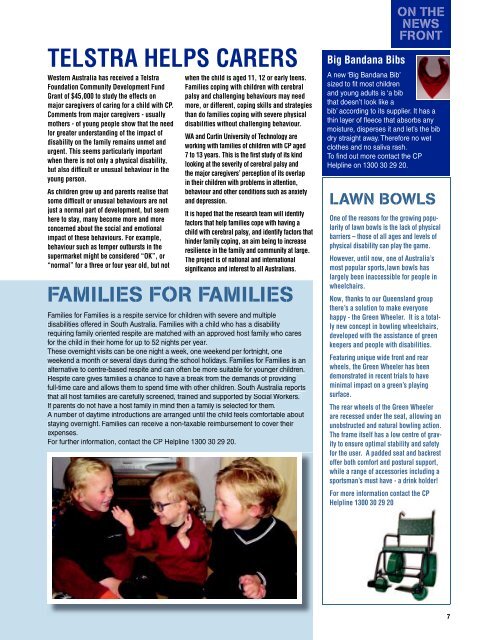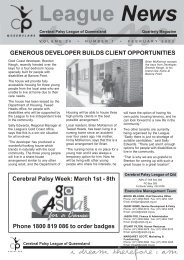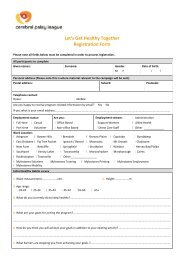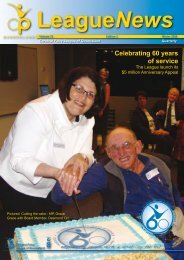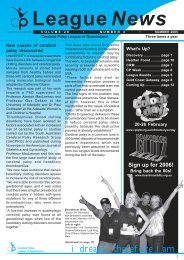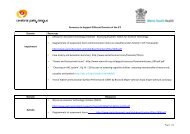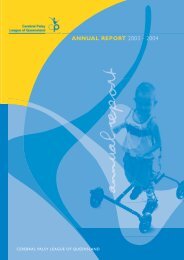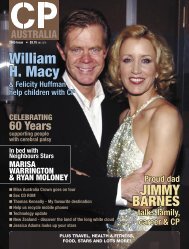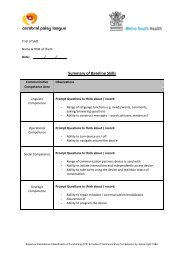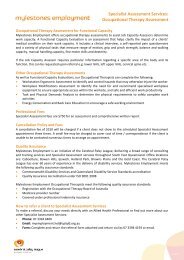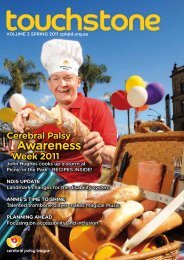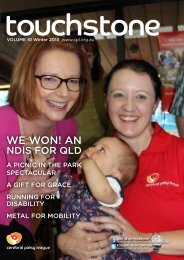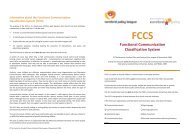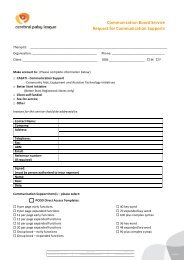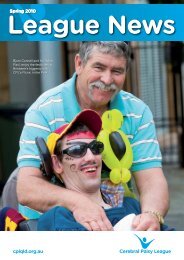SAMI LUKIS SAMI LUKIS - Cerebral Palsy League
SAMI LUKIS SAMI LUKIS - Cerebral Palsy League
SAMI LUKIS SAMI LUKIS - Cerebral Palsy League
Create successful ePaper yourself
Turn your PDF publications into a flip-book with our unique Google optimized e-Paper software.
TELSTRA HELPS CARERS<br />
Western Australia has received a Telstra<br />
Foundation Community Development Fund<br />
Grant of $45,000 to study the effects on<br />
major caregivers of caring for a child with CP.<br />
Comments from major caregivers - usually<br />
mothers - of young people show that the need<br />
for greater understanding of the impact of<br />
disability on the family remains unmet and<br />
urgent. This seems particularly important<br />
when there is not only a physical disability,<br />
but also difficult or unusual behaviour in the<br />
young person.<br />
As children grow up and parents realise that<br />
some difficult or unusual behaviours are not<br />
just a normal part of development, but seem<br />
here to stay, many become more and more<br />
concerned about the social and emotional<br />
impact of these behaviours. For example,<br />
behaviour such as temper outbursts in the<br />
supermarket might be considered “OK”, or<br />
“normal” for a three or four year old, but not<br />
when the child is aged 11, 12 or early teens.<br />
Families coping with children with cerebral<br />
palsy and challenging behaviours may need<br />
more, or different, coping skills and strategies<br />
than do families coping with severe physical<br />
disabilities without challenging behaviour.<br />
WA and Curtin University of Technology are<br />
working with families of children with CP aged<br />
7 to 13 years. This is the first study of its kind<br />
looking at the severity of cerebral palsy and<br />
the major caregivers’ perception of its overlap<br />
in their children with problems in attention,<br />
behaviour and other conditions such as anxiety<br />
and depression.<br />
It is hoped that the research team will identify<br />
factors that help families cope with having a<br />
child with cerebral palsy, and identify factors that<br />
hinder family coping, an aim being to increase<br />
resilience in the family and community at large.<br />
The project is of national and international<br />
significance and interest to all Australians.<br />
FAMILIES FOR FAMILIES<br />
Families for Families is a respite service for children with severe and multiple<br />
disabilities offered in South Australia. Families with a child who has a disability<br />
requiring family oriented respite are matched with an approved host family who cares<br />
for the child in their home for up to 52 nights per year.<br />
These overnight visits can be one night a week, one weekend per fortnight, one<br />
weekend a month or several days during the school holidays. Families for Families is an<br />
alternative to centre-based respite and can often be more suitable for younger children.<br />
Respite care gives families a chance to have a break from the demands of providing<br />
full-time care and allows them to spend time with other children. South Australia reports<br />
that all host families are carefully screened, trained and supported by Social Workers.<br />
If parents do not have a host family in mind then a family is selected for them.<br />
A number of daytime introductions are arranged until the child feels comfortable about<br />
staying overnight. Families can receive a non-taxable reimbursement to cover their<br />
expenses.<br />
For further information, contact the CP Helpline 1300 30 29 20.<br />
Big Bandana Bibs<br />
ON THE<br />
NEWS<br />
FRONT<br />
A new ‘Big Bandana Bib’<br />
sized to fi t most children<br />
and young adults is ‘a bib<br />
that doesn’t look like a<br />
bib’ according to its supplier. It has a<br />
thin layer of fl eece that absorbs any<br />
moisture, disperses it and let’s the bib<br />
dry straight away. Therefore no wet<br />
clothes and no saliva rash.<br />
To fi nd out more contact the CP<br />
Helpline on 1300 30 29 20.<br />
LAWN BOWLS<br />
One of the reasons for the growing popularity<br />
of lawn bowls is the lack of physical<br />
barriers – those of all ages and levels of<br />
physical disability can play the game.<br />
However, until now, one of Australia’s<br />
most popular sports,lawn bowls has<br />
largely been inaccessible for people in<br />
wheelchairs.<br />
Now, thanks to our Queensland group<br />
there’s a solution to make everyone<br />
happy - the Green Wheeler. It is a totally<br />
new concept in bowling wheelchairs,<br />
developed with the assistance of green<br />
keepers and people with disabilities.<br />
Featuring unique wide front and rear<br />
wheels, the Green Wheeler has been<br />
demonstrated in recent trials to have<br />
minimal impact on a green’s playing<br />
surface.<br />
The rear wheels of the Green Wheeler<br />
are recessed under the seat, allowing an<br />
unobstructed and natural bowling action.<br />
The frame itself has a low centre of gravity<br />
to ensure optimal stability and safety<br />
for the user. A padded seat and backrest<br />
offer both comfort and postural support,<br />
while a range of accessories including a<br />
sportsman’s must have - a drink holder!<br />
For more information contact the CP<br />
Helpline 1300 30 29 20<br />
7


